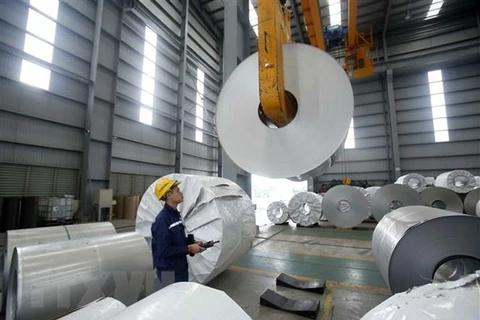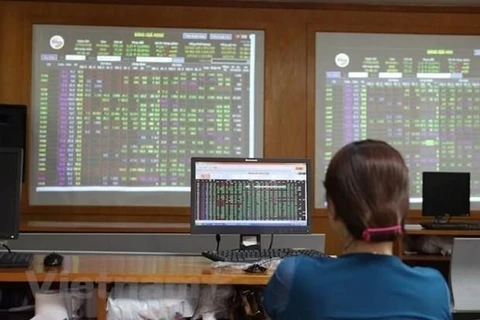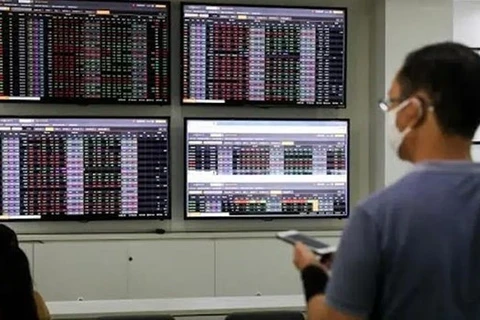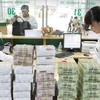Hanoi (VNA) - Vietnam has witnessed robust growth in its stock market since the beginning of this year despite complex developments of the fourth wave of COVID-19 infections.
New records have continually been set in the market, including more than 500,000 new accounts opened, liquidity topping 1 billion USD in many trading sessions, the market capitalisation surpassing 105 percent of the gross domestic product (GDP), and the benchmark VN-Index rising 24 percent from the end of last year.
Given this, it is necessary to identify factors related to those positive results while issuing warnings and preventing risks.
A talk show has been held by the “Kinh te va Du bao” (Economy and Forecasts) magazine to look into the securities market and make predictions for it with the participation of experts and managers.
Surprising but not abnormal
Ta Thanh Binh, Director of the Securities Market Development Department at the State Securities Commission, said the domestic stock market has fluctuated in line with others around the world since the year’s beginning, when the markets of the US, the UK, Thailand, and the Republic of Korea, among others have posted growth of over 10 percent.
VN-Index has gone up by more than 23 percent while the market cap by over 21 percent, reflecting investors’ trust and expectations, she noted.
She elaborated that in fact, economies around the globe are recovering, and data about the domestic macro-economy are relatively encouraging.
Vietnam was among the few economies posting positive growth in 2020. In the first half of this year, economic indexes have enjoyed a stable upward trend. Listed companies continually reported optimistic business results for the first quarter, which demonstrates public enterprises’ resilience to the pandemic.
Changes in the stock market always precede those in an economy, according to Binh.
Dr Nguyen Tri Thanh said the market nosedived when COVID-19 first broke out, but it has bounced back quickly and thrived surprisingly over the last six months.
He added that in the previous crises, the securities market of Vietnam often plunged sharply with the downward trend lingering for around one year. However, this time, the downtrend lasted for just several months.
Amid the prolonged pandemic, the surge in the market is not too abnormal though it has yet to be considered a “thermometer” for the economy, he went on.
The expert pointed out three growth factors in the market, noting that this year, the pandemic resurged more strongly but growth forecasts for countries around the world are still high thanks to the trust in vaccines and the capabilities to curb virus transmission. Major economies like the US, China, and Europe are recovering, and they are all large partners of Vietnam.
The second factor is the macro-policies with unprecedented monetary easing packages, followed by very low interest rates. In Vietnam, the middle class and young people who have their income higher than the average are investing in the stock market, and securities are now viewed as the No 1 investment channel.
Another factor is that some economic sectors are still flourishing despite the pandemic, Thanh said.
Although surveys by some domestic organisations indicated that 83 percent of enterprises have been negatively impacted by COVID-19, more than 10 percent have still posted rosy profits such as those in the technological and financial sectors, which have supported the Vietnamese stock market to go up in the recent past, he added.
Foreign investors maintain sales
Phan Duc Hieu, Deputy Director of the Central Institute for Economic Management (CIEM), said the money flow into the market is currently coming from individual investors, many of whom are new comers.
The recent growth in the stock market is largely contributed by a strong increase of individual investors, he noted, pointing out that foreign investors have maintained stock sales since the beginning of this year, with a value of about 32 trillion VND, while domestic individual investors have mushroomed continually and had frequent activities.
Money savings and working capital are being channeled into the stock market by individual investors, making the Vietnamese securities market more unpredictable as decisions are not made by professional investors.
Binh said foreign investors are selling more stocks but buying more bonds, not to mention their considerable unused cash. Maybe they are waiting for the next opportunities.
Thanh held that there will be both numerous favourable conditions and challenges in the next 6 - 12 months. Changes in the stock market are associated with the economy’ increasingly clear recovery, so it is necessary to pay attention to fundamental issues like stabilising the macro-economy, restructuring the stock market, and managing risks./.


























